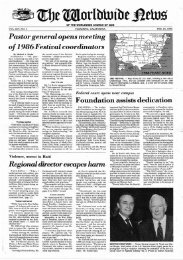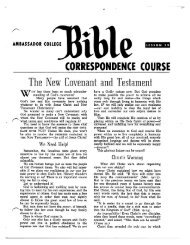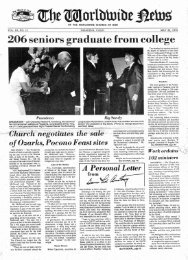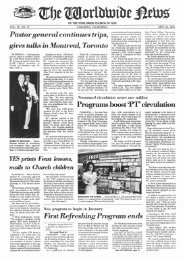Crucifixion Was Not on Friday (1968)_b.pdf - Herbert W. Armstrong
Crucifixion Was Not on Friday (1968)_b.pdf - Herbert W. Armstrong
Crucifixion Was Not on Friday (1968)_b.pdf - Herbert W. Armstrong
You also want an ePaper? Increase the reach of your titles
YUMPU automatically turns print PDFs into web optimized ePapers that Google loves.
The <str<strong>on</strong>g>Crucifixi<strong>on</strong></str<strong>on</strong>g> \Vas <str<strong>on</strong>g>Not</str<strong>on</strong>g> <strong>on</strong> <strong>Friday</strong> 19<br />
demnati<strong>on</strong> is voiced in Hosea 2: 11 against the House of Israel.<br />
But do we find specific laws in the Bible which forbid the<br />
Jews to determine for themselves when the year begins?<br />
Indeed we do: "There shall not be found am<strong>on</strong>g you . . .<br />
an OBSERVER OF TIMES ..." (Deut. 18:10). The same command<br />
is repeated in Leviticus 19:26: "Ye shall not eat any<br />
thing with the blood ... nor OBSERVE TIMES." Why? "For<br />
these nati<strong>on</strong>s, which thou shalt possess, hearken unto observers<br />
of times, and unto diviners: but as for thee, the Lord thy God<br />
hath not suffered thee so to do" (Deut. 18: 14).<br />
The words "observer of times" are translated from ananmeaning<br />
"cloud" - in the original Hebrew. An observer of<br />
times is <strong>on</strong>e who "watched the clouds" in order to determine<br />
when the winter rainy seas<strong>on</strong> was over and when the spring<br />
harvest seas<strong>on</strong> would begin. He was <strong>on</strong>e who set himself up in<br />
place of God to determine when the year should begin in the<br />
spring. But God forbids any such thing.<br />
<str<strong>on</strong>g>Not</str<strong>on</strong>g>ice from Galatians 4: 10 that Paul forbids the observance<br />
of "times" or "m<strong>on</strong>ths" and holidays which the Gentile<br />
c<strong>on</strong>verts had been accustomed to celebrate. Here is a surprising<br />
NEW TESTAMENT command not to follow the m<strong>on</strong>ths of<br />
the pagan Roman calendar then in use, but rather to follow<br />
the m<strong>on</strong>ths as God gave them. Because this command was<br />
not followed by the professing Christian world, the Roman<br />
calendar is still in use today.<br />
If the Jews have not preserved the Sacred Calendar since<br />
the crucifixi<strong>on</strong>, then Christians would not know when to observe<br />
the Passover ANNUALLY - or any of the other Holy<br />
Days of God commanded for New Testament times (I Cor.<br />
5:8 and 16:8, Acts 18:21 and 20:6). For proof that the Passover<br />
has to be observed annually - not several times each<br />
year - write immediately for Mr. Armstr<strong>on</strong>g's free booklet,<br />
When and How Often Should We Partake of the "Lord's Supper"?<br />
(See Bens<strong>on</strong>'s Commentary and Scott's Commentary for<br />
further particulars <strong>on</strong> an "observer of times.")<br />
How plain that God has required the Jews to preserve His<br />
sacred calendar!<br />
Even the great Jewish calendar expert Maim<strong>on</strong>edes, who

















